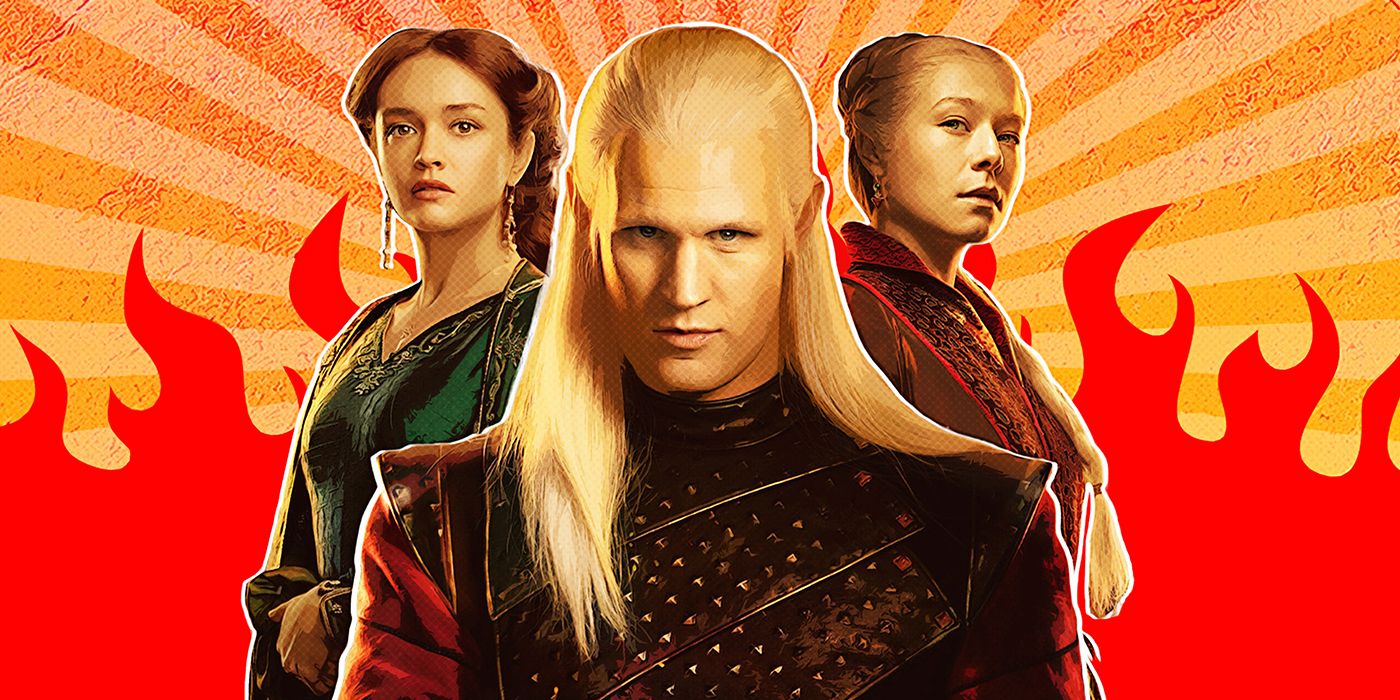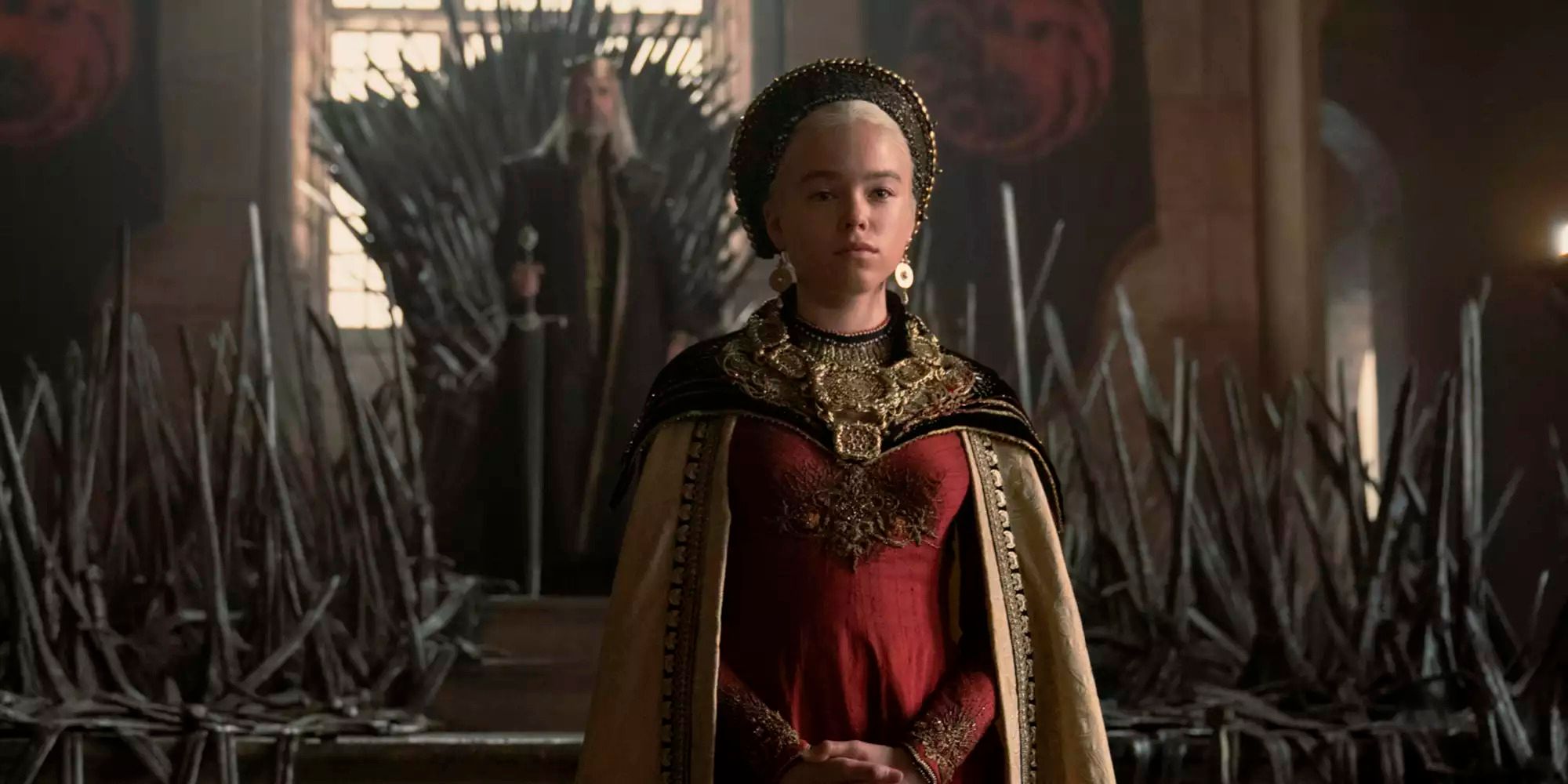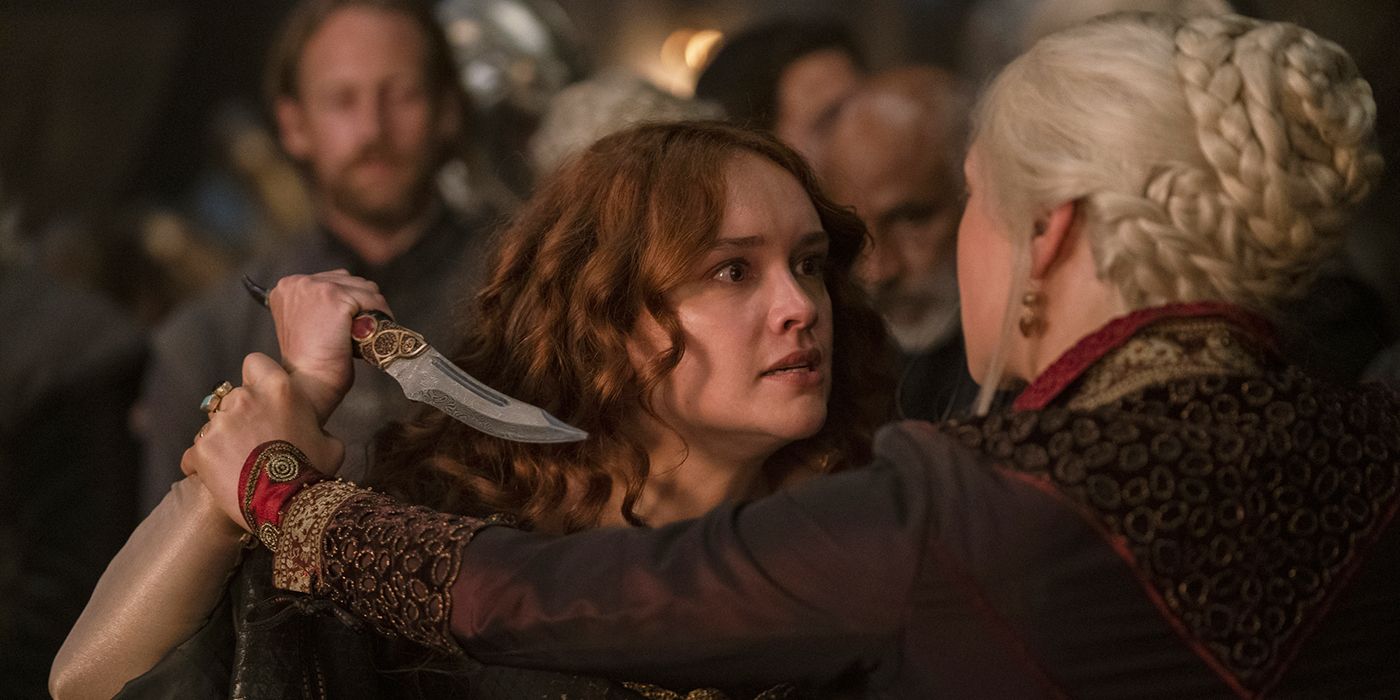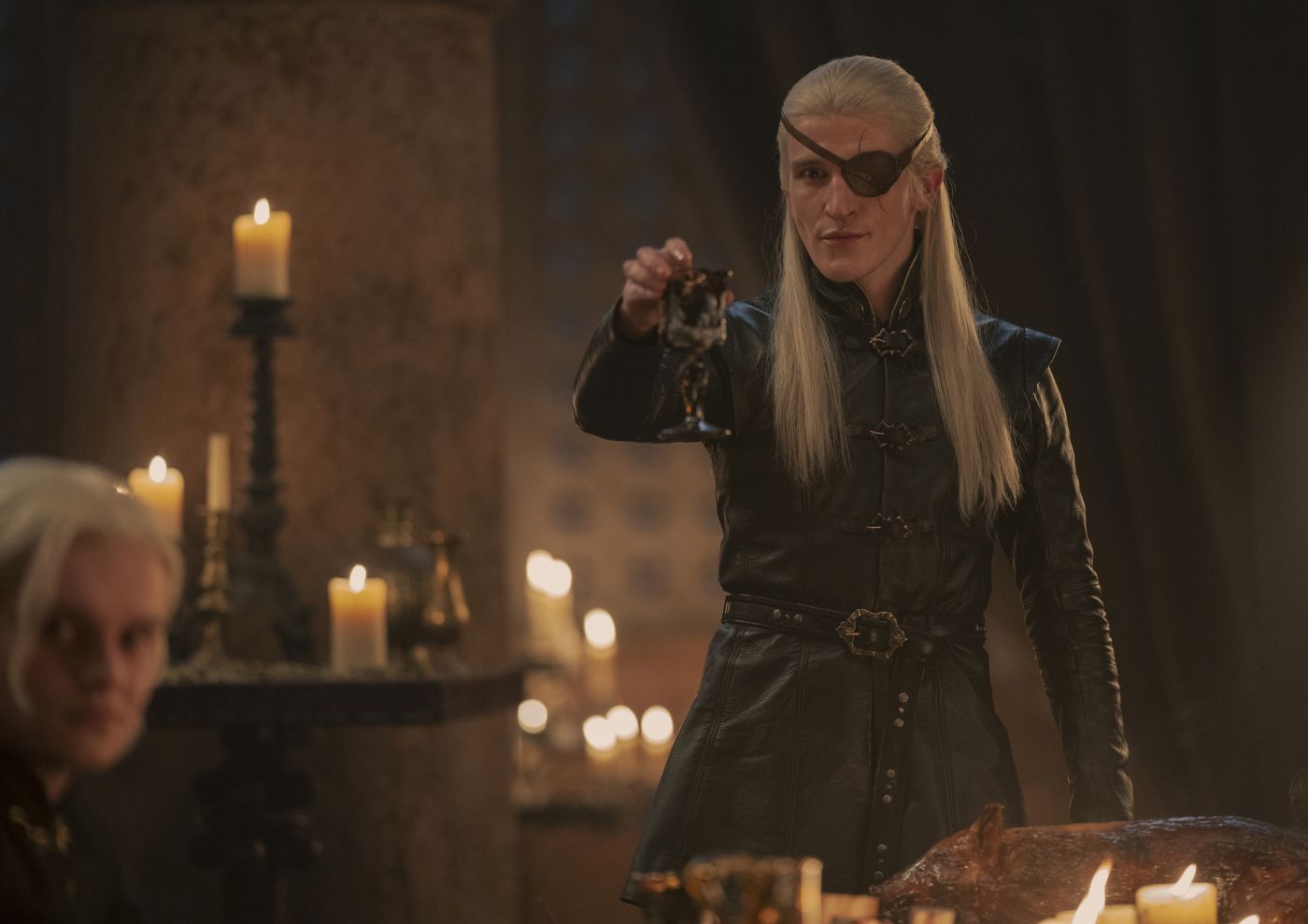Editor's note: The below contains spoilers for Season 1 of House of the Dragon.
The first season of House of the Dragon has just come to an end on HBO, and audience feelings about it are mixed. On one hand, there’s no denying that the show was a massive hit, bringing the Game of Thrones back to the public discourse after that god-awful finale. On the other, many viewers were more than a bit disappointed with a medieval-inspired fantasy show that had very few dragon flights and sword fights, and too many time jumps for its own good. To a considerable number of viewers, especially those already familiar with the Fire and Blood novel on which the series is based, the first stage of the Targaryen civil war that changed the fate of Westeros felt underwhelming on screen.
There just isn’t enough epic-ness in this particular fantasy epic. But was there supposed to be? Or are we judging House of the Dragon all wrong? Sure, the show might not be among the best genre pieces in TV history, but if we look at it as a wealthy family drama… Oh, boy, it’s one of the good ones! And maybe, just maybe, that’s precisely what it was meant to be.
'House of the Dragon's Power Struggles Resemble Another HBO Show
Let’s play a little game. Try to guess which show I’m talking about: a wealthy, ailing patriarch is inches away from death, and his new wife and children from various marriages are fighting for who should take over his massive empire. Well, since this is an article about House of Dragon, chances are you thought of King Viserys (Paddy Considine) and his mysterious disease. The wife, in this scenario, would be Queen Alicent (Olivia Cooke), and the children, Princess Rhaenyra (Emma D’Arcy) and Prince Aegon (Tom Glynn-Carney).
But try to put Westerosi power disputes aside for a while and read that synopsis again. Is it possible that it pertains not to House of the Dragon, but to the first season of HBO’s own Succession? In the show’s first few episodes, media mogul Logan Roy (Brian Cox) has a stroke, and his four children fight over who shall take his place as the CEO of Waystar Royco. Meanwhile, his current wife, Marcia (Hiam Abbas), is looking to gain more power over some of the company’s assets. Pretty similar to the drama going on behind the walls of the Red Keep, huh? And if we tweak or simply remove some details of the basic plot outlined above, the line that separates House of the Dragon from other rich family dramas becomes almost invisible. Ditch the death factor, and we have the foundation for Dynasty, both the classic 80s soap opera and the 2017 remake. Switch the new wife for an ex-wife, and you have Empire. Replace the disease with prison, and we could just as easily be talking about beloved Fox comedy Arrested Development. Hell, between kissing cousins and illegitimate children popping up all over the place, these shows probably have the same amount of incest as any Targaryen household.
There is, of course, a lot in common between the lines of succession of a classic monarchy and a family business. For starters, both are based on blood, in the genetic sense of the word. But that’s not the only thing that makes House of the Dragon so similar to other shows centering on the victories and shortcomings of wealthy families. It’s not just a matter of setting the story in a specific kind of political and/or economic environment. How the story is framed is also extremely important. Game of Thrones itself frequently dealt with clashes between different branches of the same family, but framed it in the context of war. Stannis (Stephen Dillane) and Renly Baratheon (Gethin Anthony) settled their differences through official meetings, bloody battles, and successful assassination attempts. The closest the show ever got to the kind of “can’t look away” drama found in House the Dragon was the horny backstabbing fest that was House Lannister, with Cersei (Lena Headey) sleeping with her twin brother, Jaime (Nikolaj Coster-Waldau) on the regular, and patriarch Tywin (Charles Dance) stealing his son’s mistress and getting her to testify against him in court - and this lasted only for an episode or two.
'House of the Dragon' Shouldn't Try to Be Like 'Game of Thrones'
No, House of the Dragon is made of entirely different stuff. When it tries to be like Game of Thrones, that’s when the show is at its most boring - much, in fact, like the children of those rich, problematic patriarchs that always fail to emulate their fathers’ business style. Sure, the Stepstones are of strategic importance to those holding power in Westeros, but do we really care about the war going on down there? Do the showrunners want us to care? Because, if they did, maybe they should have dedicated a little more time to showing viewers what was going on on the battlefield instead of simply having the small council talk about it for two minutes an episode. And no matter how cruel the Crabfeeder (Daniel Scott-Smith) is, no one will tremble in fear of a bad guy that only appears twice before dying, even if he looks threateningly at the camera. Throughout the show’s first season, what really grabbed the attention of fans were things like whether Rhaenyra and her uncle Daemon (Matt Smith) would get together, killing Rhaenyra’s husband, Laenor (John Macmilan), in the process, and whether Viserys would actually marry his daughter’s childhood friend. It was when it focused on these kinds of plots that House of the Dragon truly shined.
Still not convinced? Then let’s take a quick look at three of the show’s best scenes so far: Rhaenyra and Alicent’s fight over little Aemond’s (Leo Ashton) lost eye, Viserys’ farewell dinner, and the small council meeting after the king’s death. The first one takes place in Episode 7, “Driftmark,” in which the whole cast gets together to mourn the passing of Laena Velaryon (Nana Blondell). After an extremely awkward service that had backhanded comments about illegitimate children, drunk teenagers, and an elderly man mistakenly calling his second wife by his deceased first wife’s name, the Targaryen kids got into an argument that quickly got out of hand. It started with Aemond bonding with Laena’s now orphaned dragon and claiming her as his own. This was perceived by Laena’s daughters, Baela (Bethany Antonia) and Rhaena (Phoebe Campbell), as akin to theft. The girls’ accusation was supported by Rhaenyra’s boys, Jacaerys (Leo Hart) and Lucerys (Harvey Sadler), and what started as a verbal exchange escalated to physical conflict in a matter of seconds. Suddenly, young Lucerys was stabbing Aemond in the face, blinding the boy in one eye.
Anyone that was ever a child knows that it doesn’t take mutilation to get the parents involved in a playground kerfuffle, and that sometimes the adults fight dirtier than the kids. Rightfully pissed with Rhaenyra and Lucerys, Alicent gets progressively angrier as her husband continuously refuses to pick a side in the fight between his son and his grandson. She grabs a knife and threatens to cut out an eye from either mother or child, calming down only after drawing some blood from Rhaenyra’s arm. Though there were some elements of power play in this scene — the legitimacy of Rhaenyra’s children played a considerable role — this isn’t your regular run-of-the-mill fantasy epic debacle. Instead, it’s your regular run-of-the-mill family feud. It’s the kind of argument we have all witnessed at our schools and neighborhoods, though maybe without the missing eye and the white wigs. It’s the kind of thing that only appears on TV in family dramas and occasional trashy reality show.
The same can be said about Viserys’ last meal in Episode 8, “The Lord of the Tides.” For a brief moment, the whole family puts their differences aside to enjoy a nice dinner in honor of the dying king. There are even some unexpected heartwarming toasts, as well as a lovely, completely innocent dance between Lucerys (Elliot Grihault) and his aunt Helaena (Phia Saban). However, everything goes downhill after Viserys feels too sick to go on and has to be taken to his room. Aemond (Ewan Mitchell) once again calls Lucerys and Jacaerys’ (Harry Collett) parentage into question, and Alicent's knack for diplomacy is the only reason things don’t get even uglier. With or without the fight, this is the kind of intimate, Scenes from a Marriage-like scene that doesn’t usually make the cut in fantasy epics. Episode 9’s small council meeting is a bit closer to what we would expect from Game of Thrones. Still, it’s not hard to draw a parallel between Alicent’s shock at her father and his allies planned coup d’état and Shiv (Sarah Snook) and Roman Roy’s (Kieran Culkin) clear discomfort with Kendall’s (Jeremy Strong) insistence on discussing the company’s succession while their father is in the ICU.
Scenes like these are what makes House of the Dragon an entertaining show. To go in expecting actual dragons and broadsword fights is a recipe for certain disappointment. These things are still there, but not as much as they were in Game of Thrones, and also not with the same level of investment. If classic fantasy tropes are what you’re looking for, you’re better off taking a peek at The Rings of Power. To truly enjoy House of the Dragon, it's best to look at it from a different perspective. By doing so, even the time skips will make a lot more sense: instead of a constant promise of action that never delivers, what we're seeing are snippets of the life of a complicated family with too much power and money for their own good.




